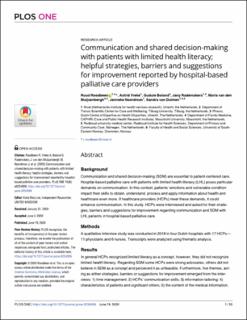| dc.contributor.author | Roodbeen, Ruud | |
| dc.contributor.author | Vreke, Astrid | |
| dc.contributor.author | Boland, Gudule | |
| dc.contributor.author | Rademakers, Jany | |
| dc.contributor.author | van den Muijsenbergh, Maria | |
| dc.contributor.author | Noordman, Janneke | |
| dc.contributor.author | van Dulmen, Sandra | |
| dc.date.accessioned | 2021-03-25T11:44:28Z | |
| dc.date.available | 2021-03-25T11:44:28Z | |
| dc.date.created | 2020-09-15T11:56:26Z | |
| dc.date.issued | 2020 | |
| dc.identifier.citation | Roodbeen, R., Vreke, A., Boland, G., Rademakers, J., van den Muijsenbergh, M., Noordman, J., & van Dulmen, S. (2020). Communication and shared decision-making with patients with limited health literacy; helpful strategies, barriers and suggestions for improvement reported by hospital-based palliative care providers. PloS one, 15(6), e0234926. | en_US |
| dc.identifier.issn | 1932-6203 | |
| dc.identifier.uri | https://hdl.handle.net/11250/2735519 | |
| dc.description.abstract | Background: Communication and shared decision-making (SDM) are essential to patient-centered care. Hospital-based palliative care with patients with limited health literacy (LHL) poses particular demands on communication. In this context, patients’ emotions and vulnerable condition impact their skills to obtain, understand, process and apply information about health and healthcare even more. If healthcare providers (HCPs) meet these demands, it could enhance communication. In this study, HCPs were interviewed and asked for their strategies, barriers and suggestions for improvement regarding communication and SDM with LHL patients in hospital-based palliative care.
Methods: A qualitative interview study was conducted in 2018 in four Dutch hospitals with 17 HCPs—11 physicians and 6 nurses. Transcripts were analyzed using thematic analysis.
Results: In general HCPs recognized limited literacy as a concept, however, they did not recognize limited health literacy. Regarding SDM some HCPs were strong advocates, others did not believe in SDM as a concept and perceived it as unfeasible. Furthermore, five themes, acting as either strategies, barriers or suggestions for improvement emerged from the interviews: 1) time management; 2) HCPs’ communication skills; 3) information tailoring; 4) characteristics of patients and significant others; 5) the content of the medical information.
Conclusions: According to HCPs, more time to communicate with their patients could resolve the most prominent barriers emerged from this study. Further research should investigate the organizational possibilities for this and the actual effectiveness of additional time on effective communication and SDM. Additionally, more awareness for the concept of LHL is needed as a precondition for recognizing LHL. Furthermore, future research should be directed towards opportunities for tailoring communication, and the extent to which limited knowledge and complex information affect communication and SDM. This study provides first insights into perspectives of HCPs, indicating directions for research on communication, SDM and LHL in hospital-based palliative care. | en_US |
| dc.language.iso | eng | en_US |
| dc.rights | Navngivelse 4.0 Internasjonal | * |
| dc.rights.uri | http://creativecommons.org/licenses/by/4.0/deed.no | * |
| dc.title | Communication and shared decision-making with patients with limited health literacy; helpful strategies, barriers and suggestions for improvement reported by hospital-based palliative care providers | en_US |
| dc.type | Peer reviewed | en_US |
| dc.type | Journal article | en_US |
| dc.description.version | publishedVersion | en_US |
| dc.rights.holder | © 2020 Roodbeen et al. | en_US |
| dc.source.volume | 15 | en_US |
| dc.source.journal | PLOS ONE | en_US |
| dc.source.issue | 6 | en_US |
| dc.identifier.doi | https://doi.org/10.1371/journal.pone.0234926 | |
| dc.identifier.cristin | 1830024 | |
| dc.source.articlenumber | e0234926 | en_US |
| cristin.ispublished | true | |
| cristin.fulltext | original | |
| cristin.qualitycode | 1 | |

